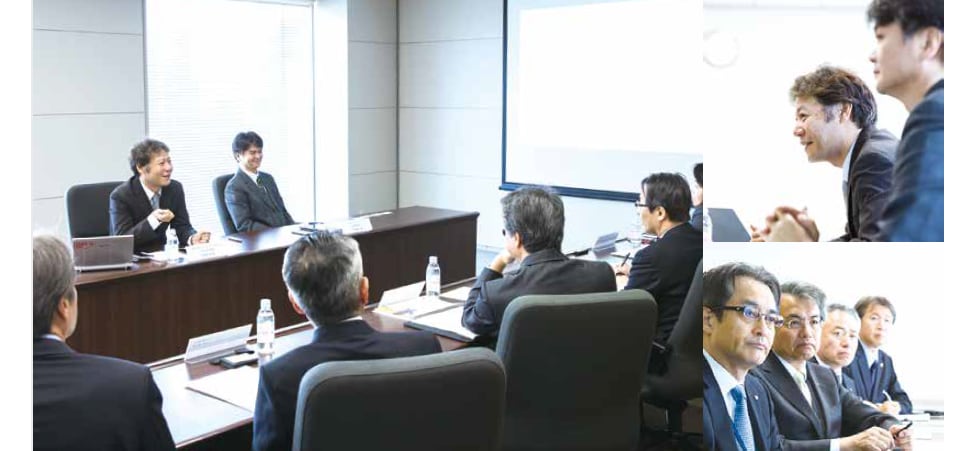Targeting Human Rights Reponses at the Supply Chain
Implementation Date: April 14, 2017
The United Kingdom passed the Modern Slavery Act in March 2015—a clear indication of rising global moves toward human rights related legislation at the supply chain level. In such an environment, and with the overseas production ratio of the TDK Group rising above 80%, the need has definitely emerged for responses keyed to the international trends. To more thoroughly explore the proper approach for TDK in addressing human rights within its supply chain, two outside experts were invited to take part in a study session addressing that very theme.
Learning from Frontline Human Rights Responses
For this study session, welcomed as speakers were Mr. Takeshi Shimotaya of Sustainavison Ltd., a figure with penetrating insight in the field of global human rights issues, and Mr. Masaki Wada of Energetic Green Co., Ltd., a man with a long history of promoting CSR procurement at corporate frontlines. Five TDK employees also took part, including two corporate officers in charge of procurement and CSR.
TDK clearly declares its posture of respect for human rights within the Group’s Code of Conduct, moving to fulfill those social responsibilities rooted in close consideration of human rights, workplace environments, and other crucial matters in all procurement transactions as well. In fiscal 2016, three important themes were established within one of our CSR issues: Consider the Societal and Environment Impact of the Supply Chain. This was a move to bolster the Group stance on that front. In the wake of passage of the UK Modern Slavery Act, the TDK Group Policy on Human Rights was formulated in August of 2016, followed by regular disclosure of the status of approaches under the guidelines.
This study session was positioned to further expand the depth of initiatives advanced to date to more closely zero in on the future. The idea was to acquire outside perspectives to help determine specific areas demanding keener attention, rethinking our conventional approaches to widen the channels of mutual understanding. The talks by Mr. Shimotaya and Mr. Wada were both presented from their respective specialized viewpoints. They sought to profile international moves toward human rights friendly legislation, the status of forced labor, child labor, and other illicit practices confirmed worldwide, the rising global attention to Japan and the supply chains of Japanese companies in the run-up to the 2020 Tokyo Olympic and Paralympic Games, and other relevant developments. At the opinion exchange following the main session, brisk discussions ensued with TDK personnel in attendance. Key queries included how to establish more pronounced awareness of CSR throughout the Group as a whole, and what approaches to adopt upon difficulties in achieving the understanding of such matters from suppliers.
Opinions and Proposals from the Experts 1
Highly transparent supply chain management through communication with industry groups, suppliers, and newly acquired companies
Takeshi Shimotaya
President & CEO
Sustainavison Ltd.
The United Nations Human Rights Council approved its Guiding Principles on Business and Human Rights in 2011. Since then a steady stream of international guidelines addressing the need to respect human rights have been announced. Related moves include disclosure of human rights related intelligence in many different nations, passage of laws to confirm and report upon human rights issues within supply chains for companies to take action in this area. International initiatives have also picked up steam at the Electric Industry Citizen Coalition (EICC) and other industrial bodies. Clearly, TDK can also expect to face demands for global collaboration with other companies in its field from here on. Being viewed with particular importance these days are moves to engineer effective CSR procurement approaches through cooperation with suppliers. To further heighten transparency, more and more companies are also choosing to publicly disclose their specific suppliers. Going forward, it will grow increasingly important to maintain a firm grasp of one’s own company’s international business structure and supply chain, followed by the use of country risk and other publicly available information as references in clarifying risk, establishing priorities and otherwise advancing human rights due diligence. In the promotion of CSR procurement as well, active communication with firms acquired through M&A promises to be indispensable. If progressive precedents are available, the know-how from such cases should be constructively infused and developed within the sphere of the corporate group.
Opinions and Proposals from the Experts 2
Proactive human rights initiatives, followed by management infusing the voices of frontline workers
Masaki Wada
CEO
Energetic Green
Laws and regulations for corporate compliance in adoption of supply chain based labor management are emerging with the focus on Europe and the U.S. They include bans on imports and exports of products for which forced labor is detected along supply chains, with substantial impact on business practices already being reported. The consequences of related problems will inevitably be felt on stock prices, not to mention prompting comments from the media and NGOs. In advancing procurement, therefore, it is critical to constantly put yourself in the position of the stakeholders. Moreover, while laws and guidelines are naturally important, being content to simply satisfy such demands can generate mistaken impressions of what truly needs to be done. With supplier audits, although detailed checks of documents must be performed, it is more critical to directly listen to the voices of workers. Potent methods on that front include setting up hotlines with supplier employees and other schemes to speedily identity problems. When understanding with suppliers is slow in coming, communication as an extension of “5S” activities or other initiatives already widely used in the manufacturing sector offers the potential for progress. Workplace-based human rights problems are prone to lead to quality defects in sectors characterized by human operation, with efforts to promote understanding of the linkage between such dynamics and quality control suggesting one potentially effective countermeasure.
Reflections on the Expert opinions
Atsuo Kobayashi
Executive Vice President
General Manager
SCM & Management System HQ TDK Corporation
This session provided the opportunity to inquire about global trends and specific examples, underscoring the severe risks posed by forced labor within the supply chain. Grasping the nature of such risks makes it easier to mount countermeasures in advance, enabling rapid responses to actual issues occurring at the supplier level. I also felt that appropriate human rights responses play an extremely important role in raising competitive strength as a progressive company, and otherwise transforming risk into opportunities. We must avoid becoming overly preoccupied with laws, guidelines, and other administrative rules. Instead, we need to set our sights on moving beyond that domain with initiatives capable of realizing the ideal process at a higher dimension of understanding.
Takakazu Momozuka
Corporate Officer
Chief Compliance Officer &
General Manager
Legal & Compliance HQ
TDK Corporation
While confirming the status of supply chains that reach around the world is obviously no easy task, this exchange reconfirmed that the first step in that direction is to develop a firm grasp of the overall schemes in place. After that, we need to prioritize the risks to target, formulate policies and then work through the PDCA cycle to promote effective initiatives. As we move to advance aggressive M&A, companies with different cultures and labor practices will also join the Group. This creates the need for solid human rights due diligence, proper sharing of the TDK corporate philosophy and DNA throughout the Group as a whole, thereby paving the way to genuine growth as a combination of financial and non-financial operations alike.









